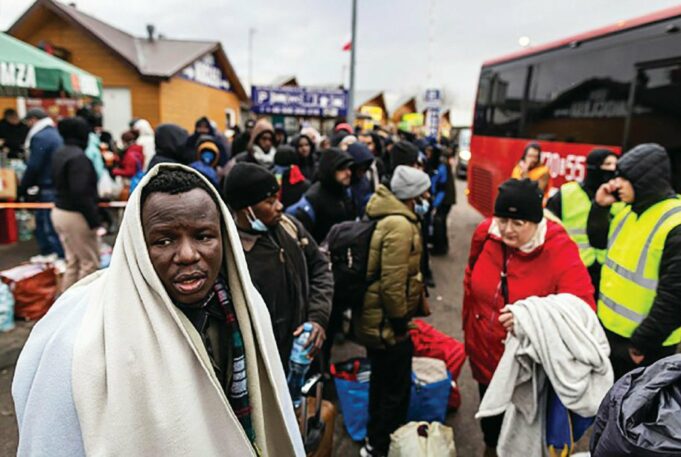Alexander Somto Orah’s studies in Ukraine were cut short when Russia invaded the neighboring country on Feb. 24. The 25-year-old Nigerian student is one of approximately one million people that has fled Ukraine since the conflict began. But his journey out was rife with racism and discrimination.
When he arrived at a train station in Ukraine’s capital city, Kyiv, women and children were being allowed on the train first, which he had no problem with. The problem was, they were only taking White women and children.
“We started shouting, because they were pushing out African women and South Asian women. So we asked them, ‘What’s happening? If you say children and women, what do you mean by that? Are you trying to say White women and children? Because these people are also women,” Mr. Orah recounted to The Final Call.
After another train came and African women still weren’t allowed on, he and others threatened those in charge. Mr. Orah and his friends were eventually able to take a train from Kyiv to Lviv, the largest city in western Ukraine. When they arrived, they witnessed more discrimination, where, again, only White women and children were allowed to board the train.
“I told them that we have so many African women that are pregnant … and it’s cold. Some of them have children,” Mr. Orah said.
After fighting for African women to board, he and his friends left the train station and eventually embarked upon a one-and-a-half-day trek to the Ukraine-Poland border. They were given food and water along the way by average Ukrainian citizens. But 30 minutes away from the border sat a barricade. The road was blocked, and officials were sending Whites to one side and foreigners, majority Africans and South Asians, to the other side.
“It started getting crazy, and I told them that what we are witnessing now is a war crime, that if we don’t speak up, it’s going to continue,” Mr. Orah recounted.
As he and others started shouting, a man in military uniform threatened to shoot. “We raised our hands up and were shouting, ‘We are students, we want to go home. We are not Ukrainians. We are not illegal immigrants,’ ” Mr. Orah said.
“We started shouting that they have to kill us here, and if one doesn’t get hurt, we are going to pounce on them … we are thousands,” he said.
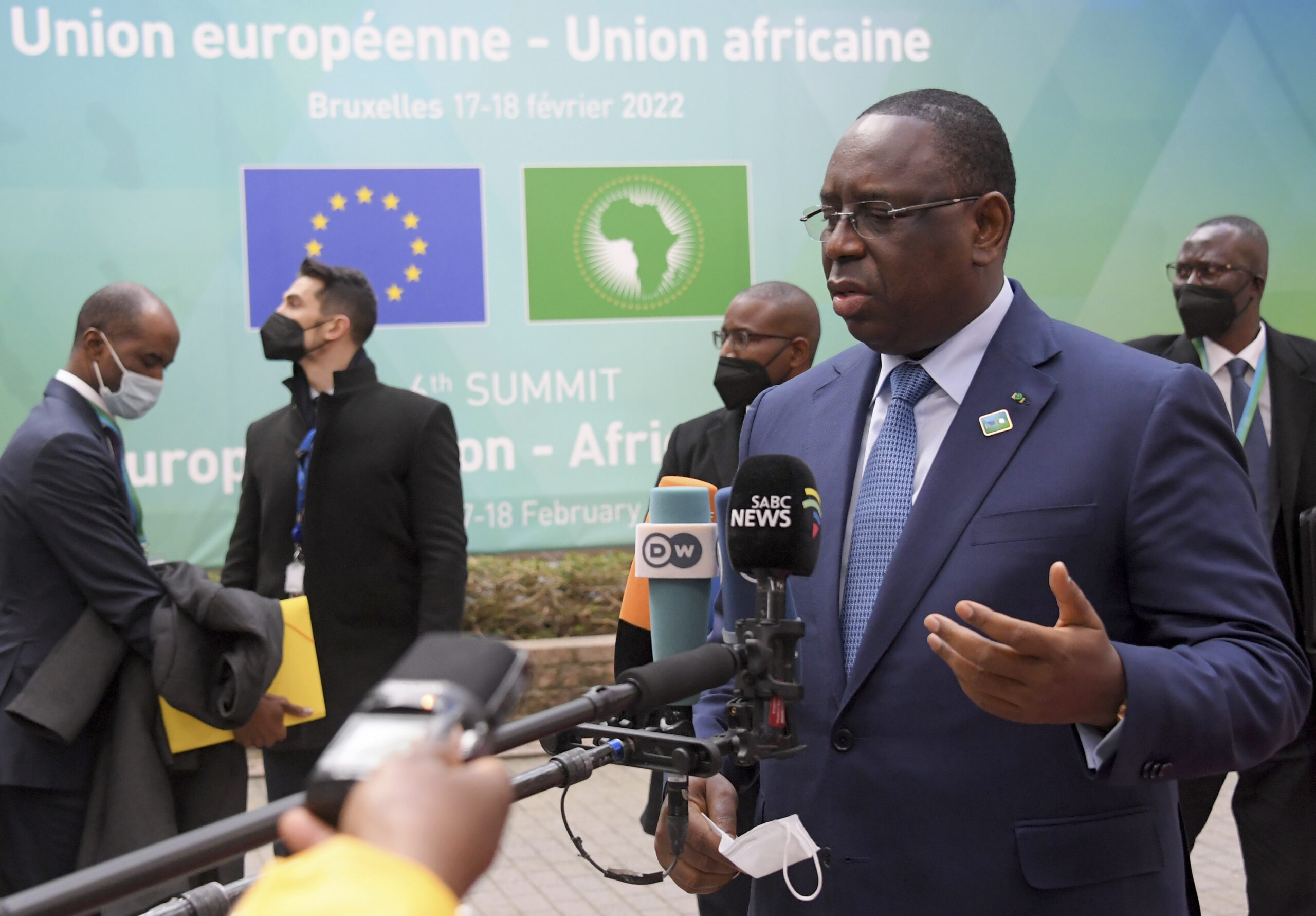
He noticed the White people there weren’t saying anything and were enjoying being before them.
“We started pushing forward, pushing forward, and we started shouting. … Before you knew, all of us started rushing to the front and we broke the barricade,” he said.
When they made it to the Ukraine-Poland border, they were told, on the Ukrainian side, that the border was closed. They slept there, and the next day, a man told them, “Indians, Africans, Arabs, you have to leave this border and go to the Romania border. We cannot accept you on this border.”
The man returned later and told them “only women and children.”
“That was the only time the Ukrainian border guards acted like human beings,” Mr. Orah said.
He is one of thousands of Africans who reported racism and discrimination while fleeing Ukraine. He and many others documented their experiences on social media, where The Final Call reached out to him. They utilized the Twitter hashtag #AfricansInUkraine to spread awareness, catching the attention of the world.
“You’ve seen reports in the media that there are different treatments used with Ukrainians and non-Ukrainians. Now, our observations—and we possibly cannot observe every single post yet—but our observation is that these are not state policies,” said Filippo Grandi, the United Nations High Commissioner for Refugees, at a March 1 press conference.
“But there are instances in which it has happened, that there’s been a different treatment. … There should be absolutely no discrimination between Ukrainians and non-Ukrainians, Europeans and non-Europeans. Everybody is fleeing from the same risks,” he continued.
Ukraine’s government acknowledged the border crisis for the first time on March 1 with a tweet by Ukraine’s foreign minister. “Russia’s invasion of Ukraine has affected Ukrainians and non-citizens in many devastating ways. Africans seeking evacuation are our friends and need to have equal opportunities to return to their home countries safely. Ukraine’s government spares no effort to solve the problem,” he tweeted.
Senegalese President Macky Sall, the current chair of the African Union, and the African Union Commission Chairperson Moussa Faki Mahamat released a statement Feb. 28 saying they were “disturbed by reports that African citizens on the Ukrainian side of the border are being refused the right to cross the border to safety.”
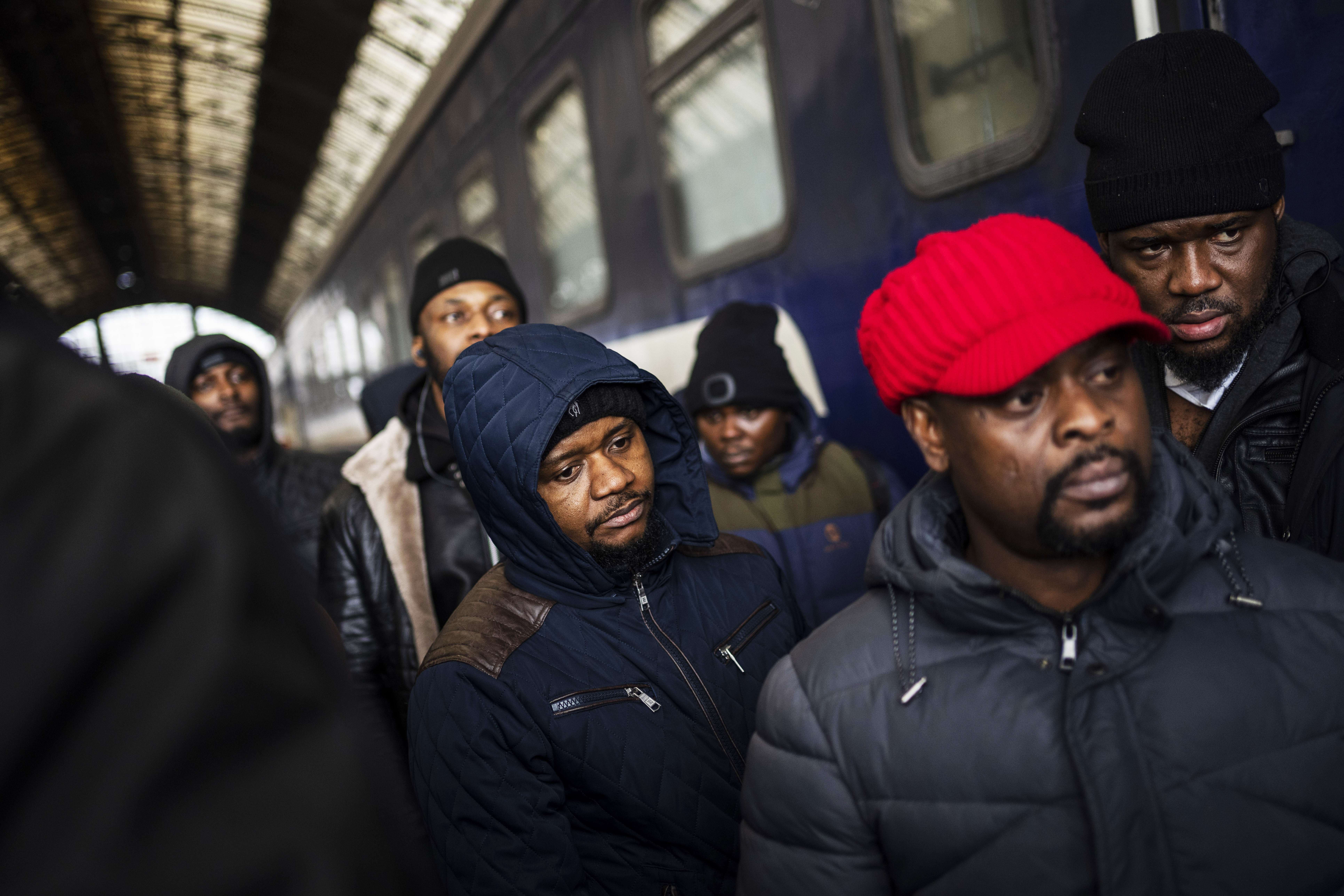
The two chairpersons recalled that “all people have the right to cross international borders during conflict, and as such, should enjoy the same rights to cross to safety from the conflict in Ukraine, notwithstanding their nationality or racial identity.”
They wrote that Africans being mistreated would be “shockingly racist and in breach (of) international law” and urged “all countries to respect international law and show the same empathy and support to all people fleeing war notwithstanding their racial identity.”
Civil rights attorneys Ben Crump and Jasmine Rand convened a civil society coalition March 2 to file an urgent appeal before the United Nations on behalf of African refugees facing racial discrimination in Ukraine and Poland. They announced their appeal to the Office of the High Commissioner for Human Rights for the U.N. and to the Committee on the Elimination of Racial Discrimination via a virtual news conference.
Other coalition members include National Bar Association president Carlos Moore; Donald Deya, CEO of the Pan African Lawyers Union; retired judge Peter Herbert; Lennox Hinds, permanent representative to the U.N. for the International Association of Democratic Lawyers; Harvard Law School Professor Ronald Sullivan; international human rights attorney Yets Asika and Rosalea Hamilton, founding director of the Institute of Law and Economics in Jamaica.
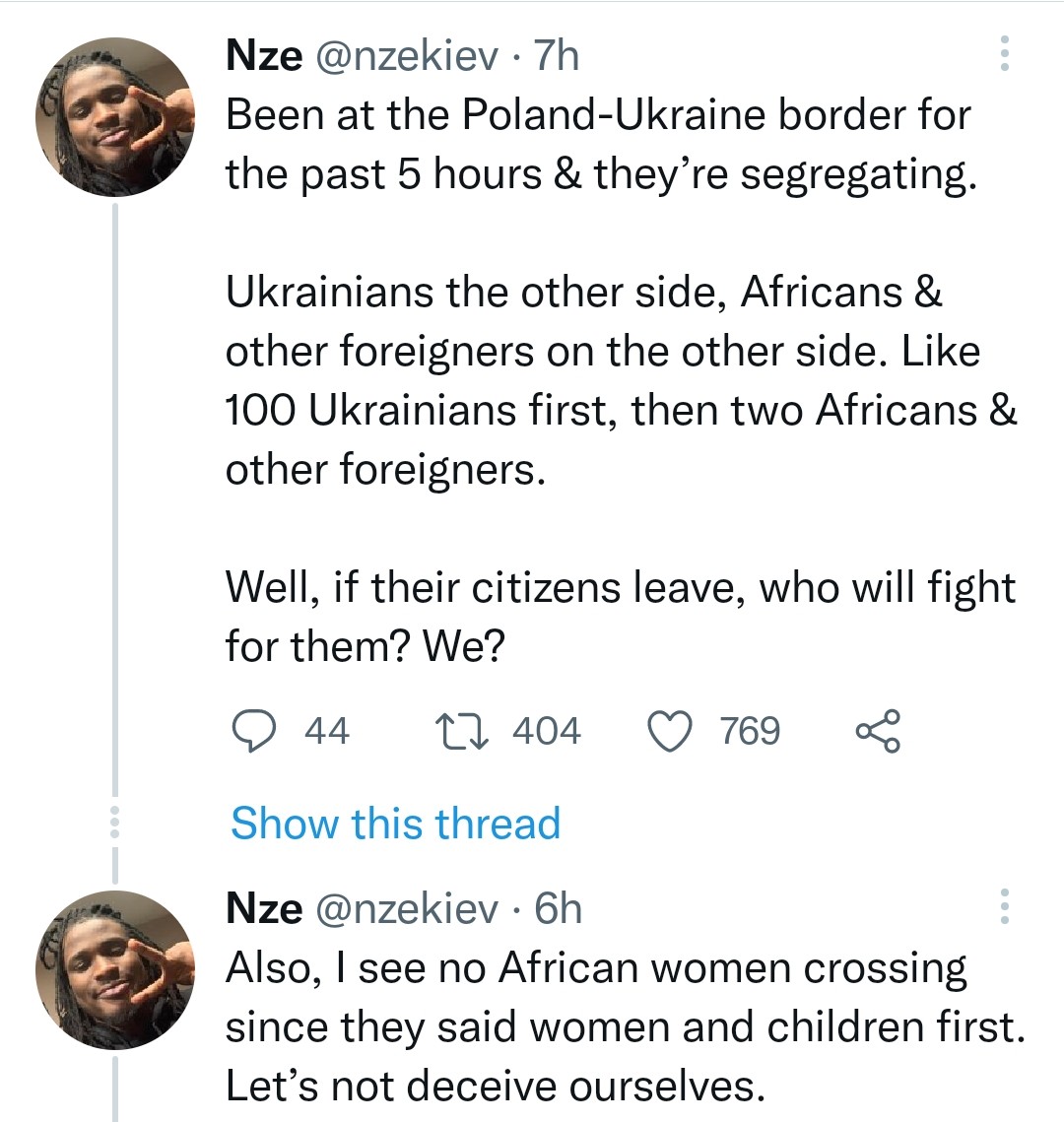
History of Ukraine and roots of White power
Ukraine is the ninth worst country for racial equality, according to a 78-country survey by the U.S. News and World Report, BAV Group, and the Wharton School of the University of Pennsylvania.
It, along with Russia, was a founding member of the Soviet Union in 1922. During World War II, the country was occupied by Nazi Germany and the Axis powers.
“The Ukrainian government, they have their political genesis in the right-wing, racist movements that were very strong in Ukraine, in particular in western Ukraine. In fact, those elements aligned themselves with the Germans, the Nazi party, during World War II,” said Ajamu Baraka, national organizer for Black Alliance for Peace, to The Final Call.
“And the Organization of Ukrainian Nationalists headed up by an individual named Stepan Bandera, they were responsible for thousands of Jews and Poles being murdered in western Ukraine and in parts of Poland. So after the war, they were reabsorbed back into the Soviet Union, and they’ve always been there.”
Shortly after the Soviet Union was terminated in 1991, Ukraine declared its independence. In 1994, the country gave up its arsenal of nuclear weapons under the Budapest Memorandum, which was signed by the United States, the United Kingdom and Russia. The countries signed that they would commit to honoring Ukraine’s sovereignty and borders.
In 2004, pro-Russian candidate Viktor Yanukovych was elected president then overthrown due to accusations of vote-rigging. The pro-Western candidate Viktor Yushchenko was then elected president. Mr. Yanukovych would go on to win the presidential election in 2010.
He was overthrown again in 2014, and an interim, pro-Western government was put in place. In March and April of that year, Russia invaded Ukraine, fighting broke out between Ukraine and pro-Russian separatists and two Ukrainian regions broke away from the country.
During that period, Ukraine became what Mr. Baraka described as “the epicenter of the international White supremacist movement.” He said the 2014 “coup” brought a government infected with neo-Nazis, ultranationalists and White supremacists to power. Far-right organizations that were fighting in support of Ukraine included the Svoboda party, the Right Sector and the Azov Battalion, an all-volunteer unit of the National Guard of Ukraine.
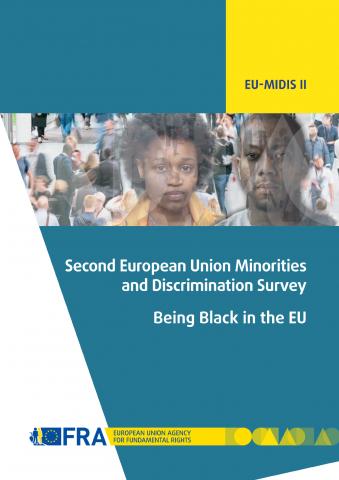
Azov was founded by Andriy Biletsky, who said in 2010 that Ukraine’s national purpose was to “lead the White races of the world in a final crusade … against Semite-led Untermenschen (subhumans).” In a 2016 report by the United Nations Office of the High Commissioner for Human Rights, the group was accused of violating international humanitarian law.
And yet, the group has been free to train and recruit members from all over the world, using Facebook and social media as a tool to attract like-minded individuals. Ali Soufan, a security consultant and former FBI agent who has studied Azov, estimated to Time magazine that more than 17,000 foreign fighters have gone to Ukraine over the past few years from 50 countries.
“And many of those people who traveled, a substantial number of those individuals came from the West, also. In the circles of the right wing, Ukraine was seen as a ‘liberated territory.’ That is, a government that had seized power that was sympathetic and supportive of the cause of White supremacy,” Mr. Baraka said.
He said there are “very strong links” between the far-right groups in Ukraine and the ones in the United States. The Atomwaffen Division, an American-based White supremacy group, sent members to train in Ukraine. The leader of the Rise Above Movement, whose members participated in the violence that occurred in Charlottesville, Va., in 2017, described Azov as an inspiration.
In December, the UN adopted a resolution condemning Nazism, neo-Nazism and all forms of racism. The only two countries that voted against the resolution were the United States and Ukraine.
“We see that these Ukrainians care nothing about Black life, just like it’s quite clear that the Biden administration, and the other European powers, care nothing about Black life, or non-European life in general,” Mr. Baraka said.
Anti-Blackness in Europe and media hypocrisy
Almost half of the refugees fleeing Ukraine have escaped to Poland, which is permitting foreigners to live there for up to 15 days without visas. Others are going to Hungary and Romania. But witnesses told ABC News that those who looked to be African or Arab were being targeted by a small number of extremists in Poland.
The recent crisis harkens back to Poland’s refusal to let thousands of Syrian and Iraqi refugees in the country last year and Belarusian President Alexander Lukashenko’s forced removal of them from his country.
Insecure actress Amanda Seales pointed out the double standards via Instagram, including the way Western media is covering the crisis.
In one video clip she posted, Ukraine’s Deputy Chief Prosecutor David Sakvarelidze says, “It’s very emotional for me, because I see European people with blue eyes and blonde hair being killed, children being killed every day with Putin’s missiles and his helicopters and his rockets.”
In another, a reporter from BFM TV in France says, translated, “We are in the 21st century, we are in a European city and we have cruise missile fire as though we were in Iraq or Afghanistan. Can you imagine?”

Kelly Cobiella, an NBC News correspondent, explained Poland’s acceptance of refugees: “To put it bluntly, these are not refugees from Syria. These are refugees from neighboring Ukraine. … These are Christians, they’re White.”
CBS News senior correspondent in Kyiv, Charlie D’Agata, said, “This isn’t a place, with all due respect, like Iraq or Afghanistan that has seen conflict raging for decades. This is a relatively civilized, relatively European—I have to choose those words carefully, too—city where you wouldn’t expect that, or hope that it’s going to happen.”
“When we see the media talking about these Ukrainians as if they are just this anomalous group of people that because of their Whiteness they can’t understand how they can be in this situation, what they’re saying without saying is that they can understand why Palestinians are in their situation,” Amanda Seales said in a video posted on her Instagram page.
“What they’re saying … is they can understand why Central Americans, why Mexicans—basically, what they’re saying is they can understand why anybody who’s not White is in any situation that is similar to the current Ukrainian situation. And what that means is what they’re saying is that they don’t consider anyone who’s not White civilized.”
Ukraine and Poland are not the only European countries where Black people are having a hard time. On the other side of the conflict, the 70,000 Russian residents that identify as Black face widespread hostility and racism that often goes unpunished, according to the SOVA Center for Information and Analysis, a Moscow-based advocacy organization.
The European Union Agency for Fundamental Rights released a “Being Black in the EU” report in 2018 that looked at the survey responses of 5,803 immigrants and descendants of immigrants of African descent in 12 member states: Austria, Denmark, Finland, France, Germany, Ireland, Italy, Luxembourg, Malta, Portugal, Sweden and the United Kingdom.
The report found that racist harassment and violence are common occurrences; police stops are often experienced as racial profiling; racial discrimination is a reality in all areas of life; the labor market is not a level playing field and skin color affects access to adequate housing.
An end to White power
Mr. Orah said he is comfortable and safe now in Poland, but that what he experienced was shocking. “Experiencing this made me realize why so many people shout about racism. I never knew it was up to this extent, to the extent that you have to segregate human beings according to their skin color,” he said.
He stated he doesn’t know what could be done to help the almost 1,000 Africans still stuck in Sumy, a city in northeastern Ukraine.
“Right now, it is no longer about money. It is about how to get them out of there,” he said.
Mr. Baraka said he wishes the racism experienced by Africans would help Black people in America come to their senses as part of the United States’ attempt to undermine the Black liberation movement has been to make Blacks “Americans.”
“And so the cultural effect, the cultural assault on our people, the ideological assault on our people has resulted in many of our people seeing the world through the lenses of an American. And taking up the enemy, whoever master’s enemy is, it becomes our enemy also,” he said. “And so we find ourselves being manipulated into supporting wars and interventions and policies that are counter to our own interests.”
He described revolutionary Pan-Africanism and the concentration of Black power as the solutions to what Africans are facing in Ukraine.
“Until Africa is respected, African people will never be respected. Until we have some power, we’re going to continue to be subjected to these kinds of treatments. So the solution: organization, struggle and defeat what we refer to as the U.S./EU/NATO ‘axis of domination,’” he said. “Anything short of that is reformism and almost delusion, because these forces, the European forces, are prepared to blow up the entire world in order to maintain their dominance. So, power has to be taken from these criminals.”
The Honorable Minister Louis Farrakhan of the Nation of Islam voiced similar words during his Saviours’ Day 2022 address, titled “The Swan Song,” where he warned America, Russia and all of Europe.
“The Messenger (Elijah Muhammad) said Europe would be one of the worst war areas of all the world. Europe. Watch Berlin. And when you start going away, the Messenger said you’ll go away by the tens of thousands to fight. He said, but you’ll come back by the fives and tens,” Minister Farrakhan said. “You can’t win another war. Russia, this will be your undoing, too. You see, all White power has to end.”












